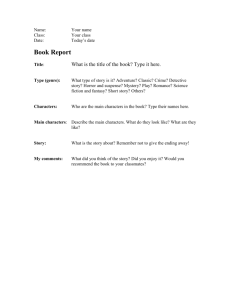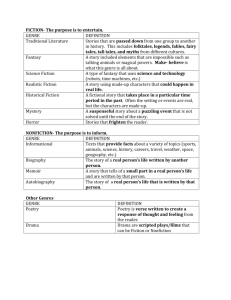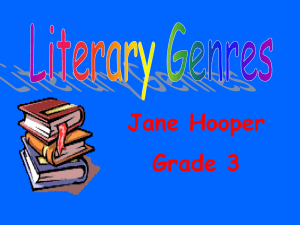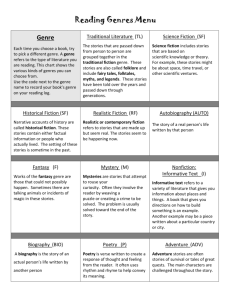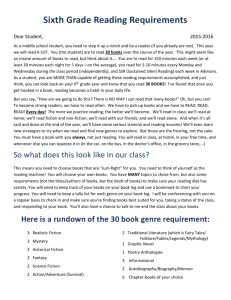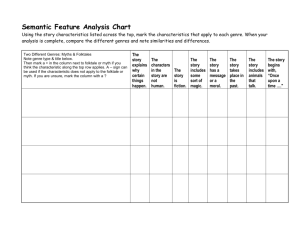Genres for Young Adult Literature
advertisement
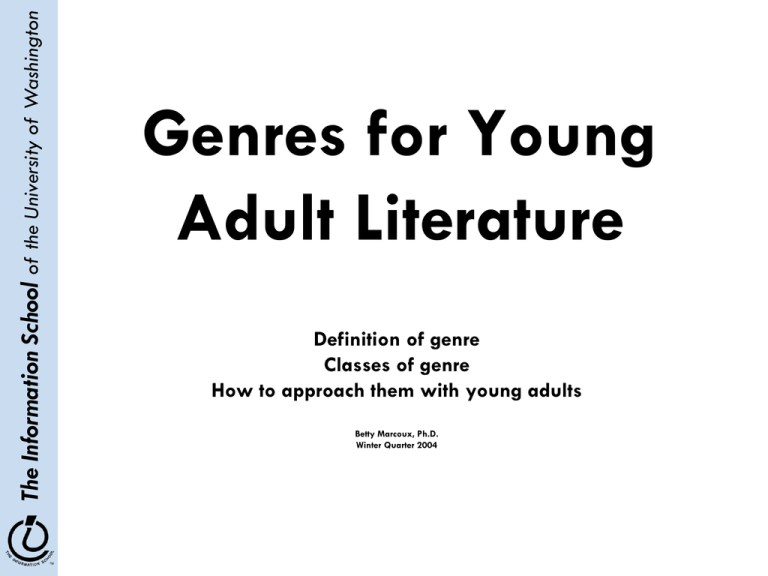
The Information School of the University of Washington Genres for Young Adult Literature Definition of genre Classes of genre How to approach them with young adults Betty Marcoux, Ph.D. Winter Quarter 2004 The Information School of the University of Washington What is a genre? • Kind or type of literatures that has a common set of characteristics • Many differences and variables within a genre • Classification of literature by genre not always simple • Seen often as arbitrary • Way of organizing literature for readers • Literary elements may vary according to genre and within genre (ie: poetry vs sonnet/lyric poetry) Different genres have different emphases on different elements • More of a helpful guide than anything else – reader’s advisory concepts The Information School of the University of Washington Genre classes/types • • • • • • • • • • Adventure Mystery Fantasy Horror True Stories Romance Sports Science Fiction Autobiographies/Biographies Hobby The Information School of the University of Washington Genre classes/types (Carlson, 1984) • • • • • • • • • • Sport stories Animal stories Stories of olden times Science fiction Stories of foreign cultures Boys and cars Adventure stories Mystery stories Vocational stories Stories of moral/ethical dilemmas The Information School of the University of Washington Genre classes/types (Carter, 2000) • • • • • • • • • • • • • • • • • • • • • • • Too good to miss Adventure Animals Family Fantasy Friendship Historical fiction Holocaust Humor Mtstery Not quite human Other lives Quest Romance Short takes Sports Starting over Survival Suspense War Westerns The writing life Youth in trouble The Information School of the University of Washington Text classifications of YA Lit. • Realism – – • • • • • • • • • Romanticism Adventure Mysteries Supernatural Humor Fantasy Science Fiction Utopias and Dystopias History – – • Life Problems People Places Non-fiction – – – Information Poetry Drama The Information School of the University of Washington Top 10 Types of Characters 2002 • • • • • • • • • • Characters like reader Characters different from reader Characters do or have done amazing things Fantasy characters Characters face tough issues Animal characters Sports figures Musicians Historical figures Detectives The Information School of the University of Washington Top 10 Books-2002 Read for fun Ever • • • • • • • • • • Harry Potter series Lord of the Rings series A child called it Holes Chicken soup for the teenage soul A walk to remember Left behind series Artemis Fowl His dark materials series The Giver • • • • • • • • • • Harry Potter series Lord of the Rings series Where the red fern grows A child called it The Outsiders To kill a mockingbird The Giver A walk to remember Hatchet Bible The Information School of the University of Washington YA statistical evidence • • • • • • 1997-2007: 13% increase of secondary school enrollment YAs say they mostly like reading a lot and are advanced readers 58% of YAs believe they “always read things that they are passionate about” 54% read constantly for their own pleasure 26% read what they are supposed to for school 21% basically don’t read much at all • • • • • • • • 55% read for fun 54% read to learn new things 42% read for school lessons 30% read due to boredom/not anything else to do 21% read and talk about books with friends 19% don’t read because it is “boring” 19% don’t read because they don’t have the time 7% don’t read because it isn’t “cool” • • • • 54% indicate they were read to a lot as a child 34% indicate they were read to sometimes 10% indicate they hardly ever were read to 5% indicate they were never read to The Information School of the University of Washington Approaches to genres with YAs • Be aware that genre similarities/differences may or may not be helpful with reader’s advisory work • Works are popular for a time and then fade as they are replaced with more timely material • Some works become icons • A classic is “news that stays news” (Ezra Pound) The Information School of the University of Washington Librarian competencies for YA work • • • • Leadership and professionalism Knowledge of client group Communication Administration – Planning – Managing • Knowledge of materials • Access to information • Services The Information School of the University of Washington Magazine appeal to YAs • • • • • • • Capitalize on fads Self-help Social relevance Special interests Time commitment Universal interest Visual appeal The Information School of the University of Washington The Chocolate War • Author – Robert Cormier 1925-2000 – Often took news stories/life experiences and put them into a novel – Wrote from early in life to death – Often censored due to uncompromising depiction of real YA life – Books read by all ages • History of publications 1940-2000 – The Chocolate War – 1974 – I Am the Cheese – 1977 – After the First Death - 1979 The Information School of the University of Washington Issues of the Chocolate War • • • • • Still a bestseller Has been censored Has won many awards/honors Translated into 12+ languages Treats evil and intimidation of YAs unlike many others since • Has a voice that comes through even though dark and foreboding • Moral focus – leads teen to consider their own feelings/ethics • Considered icon of YA literature The Information School of the University of Washington Graphic novels/comic books • Misunderstood medium • Close relatives – graphic novel usually larger version of comic book (long short story) • Story more visual than textual • Usually less substantive than regular novel format • Considered “a self-contained story that uses a combination of text and art to articulate the plot” ( K. Decandido, LJ 90) • Can be a single story or set of stories • Format is appealing to YAs as is visually oriented • Nonlinear format to the text – not unlike hypertext • Seen as more like real conversations • Develops characters through dialogue rather than narrative • Usually in paperback format • Usually in a series • Tend to tackle on the edge issues
